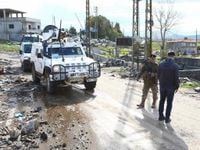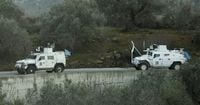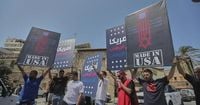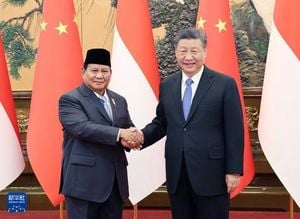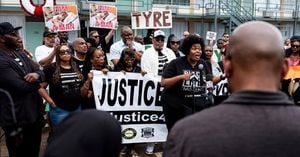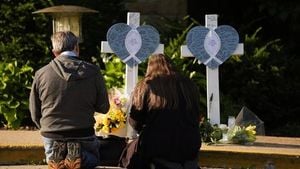After nearly five decades of vigilant patrols and tense diplomacy along the Israel-Lebanon border, the United Nations Security Council has unanimously decided to extend the UN peacekeeping mission in southern Lebanon for a final term, setting the stage for a historic withdrawal by the end of 2027. The decision, reached on Thursday, August 28, 2025, brings to a close the long-running mandate of the United Nations Interim Force in Lebanon (UNIFIL), a mission that has become a fixture in the region since its establishment in 1978.
UNIFIL was born out of conflict, created to oversee the withdrawal of Israeli troops from southern Lebanon following Israel’s 1978 invasion. Over the years, its mission expanded—most notably after the 2006 war between Israel and Hezbollah, when the Security Council tasked it with implementing resolution 1701, which called for an end to hostilities and a demilitarized buffer zone between the adversaries. The mission’s signature blue helmets have since become a symbol of international involvement in one of the Middle East’s most volatile flashpoints.
The latest Security Council resolution, led by France and supported by all 15 members, extends UNIFIL’s mandate through December 31, 2026. But this time, there’s a firm endpoint: beginning January 1, 2027, the mission will enter a one-year, “orderly and safe drawdown and withdrawal” of its 10,800 military and civilian personnel and equipment, in close consultation with the Lebanese government. By the close of 2027, UNIFIL is set to be gone, marking the end of an era for peacekeeping in Lebanon.
This decision did not come without debate. The United States and Israel have long pressed for UNIFIL’s termination, arguing that the mission has failed to curb Hezbollah’s influence and that it’s time for the Lebanese Armed Forces (LAF) to take full responsibility for security in the south. According to France 24, the Trump administration’s appointees initially demanded the mission end within six months, later settling for a final 16-month extension after negotiations with European allies. “This will be the last time the United States will support an extension of UNIFIL,” acting US Ambassador Dorothy Shea declared after the vote, making Washington’s position crystal clear.
Israel, for its part, has accused UNIFIL of being ineffective in preventing Hezbollah’s military buildup and has, at times, targeted UNIFIL positions during its operations in Lebanon. Israeli officials welcomed the Security Council’s decision. “For a change, we have some good news coming from the UN,” said Danny Danon, Israel’s representative to the United Nations, as reported by Al Jazeera.
But many European nations, including France, Italy, Austria, and Ireland, pushed back against an abrupt end to the mission. They warned that a hasty withdrawal could create a dangerous security vacuum, potentially allowing Hezbollah to expand its influence before Lebanese forces are ready to assume full control. As BBC News reported, Ireland’s Deputy Prime Minister and Minister for Defence Simon Harris described the French proposal as “more considered and provides much more time and space.” Harris, reflecting on Ireland’s more than 50-year involvement in the mission and the 47 Irish peacekeepers who lost their lives, voiced concerns about the risks of an immediate pullout. “My immediate concern as minister of defence is what that would mean for the security of our own troops, for the security of the peacekeepers in general and for the security in the region,” he said on RTÉ’s News at One.
Under the new resolution, UNIFIL will continue its core activities until the end of 2026, supporting the LAF in establishing full control of southern Lebanon, providing security, and contributing to the protection of civilians and the safe delivery of humanitarian aid. During the drawdown in 2027, the mission will maintain situational awareness around its bases and outposts, assist UN personnel, and continue its humanitarian role “within the limits of its capacities,” as detailed in the Security Council’s text.
The resolution also places new responsibilities on both Lebanon and Israel. It calls for the Lebanese government to become “the sole provider of security” in southern Lebanon north of the UN-drawn Blue Line and urges Israel to withdraw its forces from Lebanese territory. Lebanese Prime Minister Nawaf Salam welcomed the move, stating that it “reiterates the call for Israel to withdraw its forces from the five sites it continues to occupy, and affirms the necessity of extending state authority over all its territory.” However, the challenge remains steep: as UNIFIL spokesperson Andrea Tenenti noted, “The commitment of the Lebanese government is there, but how can they be deployed everywhere in the south if the [Israeli military] are still present in the south? So these are the things that are very difficult to comprehend.”
The resolution also addresses the persistent issue of Hezbollah’s armed presence. It calls for the group’s disarmament in line with resolution 1701, but Hezbollah has rejected this prospect, citing Israel’s continued occupation of Lebanese territory. The group did not immediately respond to the latest Security Council decision.
Meanwhile, the international community is urged to step up support for Lebanon’s armed forces. The Security Council’s resolution calls on nations to “intensify its support, including equipment, material and finance” to the LAF, recognizing that Lebanon’s military will need significant resources to fill the void left by departing peacekeepers. France’s representative to the UN emphasized that “any premature withdrawal could undermine or even weaken the efforts of the Lebanese Government” to stabilize the south.
For the thousands of peacekeepers who have served in Lebanon—among them the Irish, French, Italian, Austrian, and Polish troops—the final years of the mission will be a time of transition and reflection. Ireland’s Simon Harris paid tribute to their sacrifices and reaffirmed his country’s commitment to international peacekeeping, saying, “There will be other opportunities to serve with distinction in the name of peace. We remain very committed to peacekeeping in Ireland and in the Defence Forces.”
As the countdown to UNIFIL’s departure begins, the region faces a period of uncertainty. The hope, among diplomats and peacekeepers alike, is that Lebanon’s new government can seize this moment to assert its authority and chart a more stable future—free from foreign occupation and the specter of renewed conflict. The coming years will test whether that hope can be realized, or whether the end of UNIFIL will mark yet another turning point in the troubled history of the Israel-Lebanon border.
